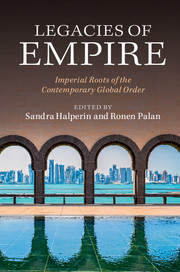Book contents
- Frontmatter
- Contents
- List of figures
- List of tables
- List of contributors
- Acknowledgments
- 1 Introduction: legacies of empire
- Part I Incomplete transitions from empires to nation states
- 2 Political military legacies of empire in world politics
- 3 The second British Empire and the re-emergence of global finance
- 4 Imperial city states, national states and post-national spatialities
- Part II Legacies of non-European empires in today's world
- Part III The future legacies of the American Empire
- Index
- References
4 - Imperial city states, national states and post-national spatialities
from Part I - Incomplete transitions from empires to nation states
Published online by Cambridge University Press: 05 August 2015
- Frontmatter
- Contents
- List of figures
- List of tables
- List of contributors
- Acknowledgments
- 1 Introduction: legacies of empire
- Part I Incomplete transitions from empires to nation states
- 2 Political military legacies of empire in world politics
- 3 The second British Empire and the re-emergence of global finance
- 4 Imperial city states, national states and post-national spatialities
- Part II Legacies of non-European empires in today's world
- Part III The future legacies of the American Empire
- Index
- References
Summary
Changes in the nature of space – specifically, the ‘deterritorialization’ of national states and the yielding of national spaces to sub-and crossnational structures and flows – have been the subject of much recent research and writing. Analyses of these ‘post-national spatialities’, as they are conceived to be, are focusing increasingly on new ‘global cities’ and ‘city regions’ and on the assertion these are developing as the key structures of an emerging post-national order.
These analyses usually converge around a number of common assumptions. First, they tend to assume that the modern national state is the culmination of the unilinear development of a particular historical sequence of forms in which each form, including the national form, supplanted or displaced the logics and practices associated with previous ones. Second, and following from this, they assume that recent changes represent the beginning of a further move along that trajectory and transition to a new, historically unprecedented, form of state.
These assumptions form the basis of Saskia Sassen's influential analyses of ‘global cities’. Sassen argues that today's global cities are different from the cities through which global trade was organized in the past because they were ‘produced in a context where most territory is encased in a thick and highly formalized national framework marked by the exclusive authority of the national state’ (2003: 5).
- Type
- Chapter
- Information
- Legacies of EmpireImperial Roots of the Contemporary Global Order, pp. 69 - 96Publisher: Cambridge University PressPrint publication year: 2015
References
- 2
- Cited by



